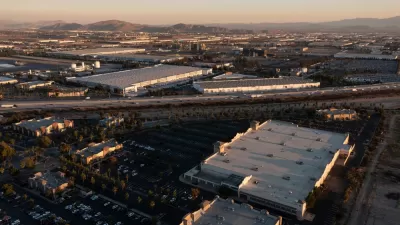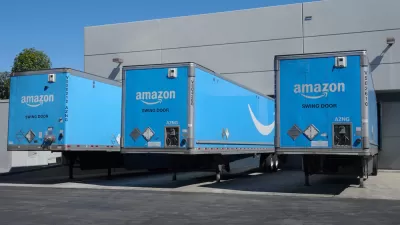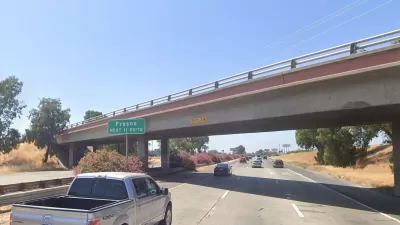Today’s massive modern distribution centers have outsized impacts on adjacent neighborhoods. But outdated zoning codes often let them slip through the cracks with no environmental review.

New York City’s zoning code isn’t written for modern warehouse facilities, according to an article in Next City by María Paula Rubiano A., letting companies like Amazon build massive facilities with little or no environmental oversight. “At the time the zoning code was written, it was a fairly accurate assessment. Warehouses in the ’60s were generally used to store things before they arrived at retailers. Freight came and went at certain hours, and the buildings were relatively small, standing, on average, less than 30 feet, or two stories tall. ”
Today, however, warehouses are “creatures of an entirely new logistics system,” bigger and taller than ever before. “Some estimates calculate that modern warehouses can bring around 1,000 additional daily truck trips to a surrounding neighborhood. The presence of these extra vehicles can worsen local air quality, upping the risk of asthma, heart attacks, and premature deaths.”
But according to the city’s zoning code, “Last-mile facilities built today still fall under the 1961 definition of a warehouse,” triggering no environmental requirements. This doesn’t just happen in New York City: “The United States is the only industrialized country without a national, standardized zoning code — meaning that there’s no universal definition of what a modern warehouse is, how hazardous it should be considered, and where it should be placed.”
Environmental justice advocates warn that not updating environmental regulations for distribution centers perpetuates historic injustice. “A recent investigation by Consumer Reports and The Guardian found that Amazon, which opened more fulfillment centers in 2020 than in the four years prior combined, has placed 69 percent of all its facilities in neighborhoods with a greater percentage of people of color.”
But zoning changes alone won’t protect public health from existing facilities. To mitigate the effects of air pollution on neighborhoods near fulfillment centers, “Last May, California’s South Coast Air Quality Management District approved the first legislation in the country regulating the indirect sources of pollution — trucks and cars — generated by the giant warehouse facilities.”
This set of regulations could serve as a model for holding warehouse builders accountable for environmental impacts.
FULL STORY: A ‘Warehouse’ by Any Other Name

Planetizen Federal Action Tracker
A weekly monitor of how Trump’s orders and actions are impacting planners and planning in America.

Congressman Proposes Bill to Rename DC Metro “Trump Train”
The Make Autorail Great Again Act would withhold federal funding to the system until the Washington Metropolitan Area Transit Authority (WMATA), rebrands as the Washington Metropolitan Authority for Greater Access (WMAGA).

The Simple Legislative Tool Transforming Vacant Downtowns
In California, Michigan and Georgia, an easy win is bringing dollars — and delight — back to city centers.

The States Losing Rural Delivery Rooms at an Alarming Pace
In some states, as few as 9% of rural hospitals still deliver babies. As a result, rising pre-term births, no adequate pre-term care and "harrowing" close calls are a growing reality.

The Small South Asian Republic Going all in on EVs
Thanks to one simple policy change less than five years ago, 65% of new cars in this Himalayan country are now electric.

DC Backpedals on Bike Lane Protection, Swaps Barriers for Paint
Citing aesthetic concerns, the city is removing the concrete barriers and flexposts that once separated Arizona Avenue cyclists from motor vehicles.
Urban Design for Planners 1: Software Tools
This six-course series explores essential urban design concepts using open source software and equips planners with the tools they need to participate fully in the urban design process.
Planning for Universal Design
Learn the tools for implementing Universal Design in planning regulations.
Smith Gee Studio
City of Charlotte
City of Camden Redevelopment Agency
City of Astoria
Transportation Research & Education Center (TREC) at Portland State University
US High Speed Rail Association
City of Camden Redevelopment Agency
Municipality of Princeton (NJ)





























